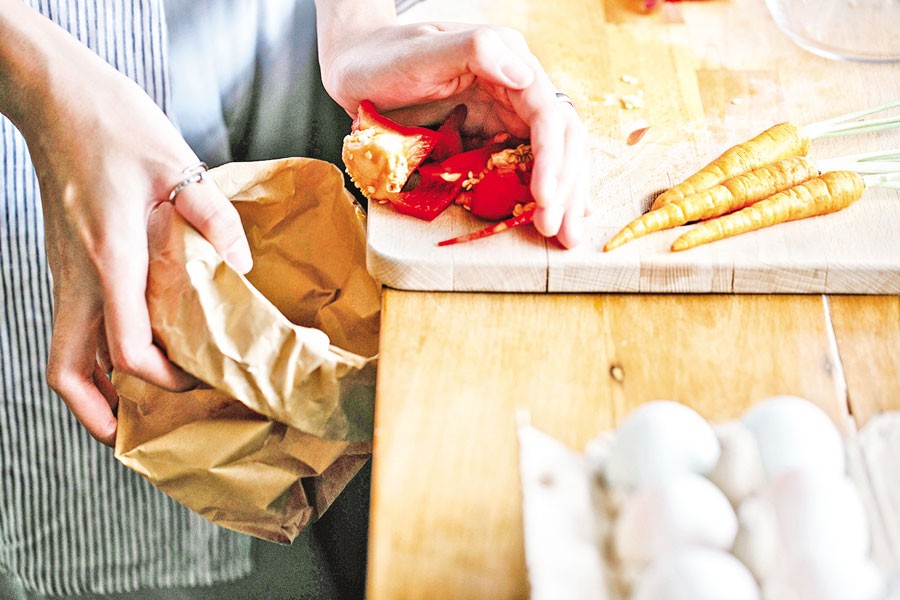
Published :
Updated :

Roughly a third of the world's food gets wasted, which is about 1.3 billion tons a year. And every year, 14.10 million tonnes of food is wasted by households in Bangladesh by research. It's not the lack of growing, enough crops get cultivated to feed the whole of humanity. But it's because of food waste. Here are some alarming facts that came in the UNEP Food Waste Index Report 2024: one-fifth of food produced for human consumption is lost or wasted globally, which means one billion meals a day, the total cost of food loss and waste for the global economy is estimated at roughly US$1 trillion, and food waste generate up to 10 per cent of global greenhouse gas emissions - almost five times the total emissions compared to the aviation sector.
Well, now, above all, the points can be a great inspiration for having a "zero food waste" philosophy, which is not just a philosophy but rather a practice to better the environment and reduce global hunger.
As most percentage of food waste is created at the household level zero, waste cooking practices will be helpful in reducing their environmental impact and operating more sustainably. We will jump straight into the possible practices to know how we can almost disappear the food waste.
Proper storage
Proper storage prevents any cooked or uncooked food from getting rotten. Perishable foods such as meats and poultry should be refrigerated as soon as possible.
Raw and cooked food should be stored differently. Otherwise, bacteria can contaminate them. Packaged food should be used before its expiration date.
Dairy products like milk, yoghurt, and cheese should be kept in the coldest part of the refrigerator. Store fruits and vegetables in the produce drawer of your refrigerator. Some fruits and vegetables, like apples and potatoes, should be stored separately. Snacks and dry items should be sealed.
Zero waste cooking
Use shrimp and crab shells and chicken skin to add a layer of flavour to soup or stock. Vegetable peels, like onions, carrots, and celery, also do wonders to enrich a sauce or stock.
In Bangladesh, there are so many recipes like gourd peeling vorta with fish or fry. Peeling potatoes after boiling can also waste less. While apple and pear peelings, as well as other citrus skins, can be used to flavour simple syrups, vinegar, and olive oil or made into marmalades or candied peels.
Leftover limes, peels and all, can be dehydrated and made into a powder that can be added to dishes for extra brightness. Or use with oil to make the room fragrance.
Use the full, throw nothing away- Full parts of vegetables should be used, the greens to stem. Stems from greens can also be used in chutneys and pestos, added to stocks and sauces, riced, and slawed.
One can create new flavours for your menus, preserve fruits or vegetables into pickles, jams or popsicles, and extend a food budget. Playing with a wide variety of vegetables, fruits, herbs, vinegar, and flavourings can inspire endless applications.
Leftover creativity
So many times, we find extra food in our kitchen. In our country, it's really a very common concept to always cook a little more for if any guest arrives. But so many times, it turns into leftover waste.
Rather than throwing it away, if we use it, food waste can be reduced to a low level. First, leftover food can be shared with animals or birds. Second, make something new dish.
Like- if rice is left, it can be fried into a fried rice bowl, Gravy into a masala fry, and Chicken can be used in veggies or snacks. Leftover raw vegetables can be used in salad making.
Compost
Composting is not for everyone, but organic and natural wastes need to be recycled properly. Waste digesters are less known, but Local government inspired them a lot.
In our household space, if it's a wide area, then using a digester cone is very helpful to nature, or if it's an urban area, then organic waste should be used as fertilizer for the home garden soil.
In the end, it's our planet and our country. Food waste is not appropriate for this decade, and we need to be serious about it.
tahmira48@gmail.com


 For all latest news, follow The Financial Express Google News channel.
For all latest news, follow The Financial Express Google News channel.